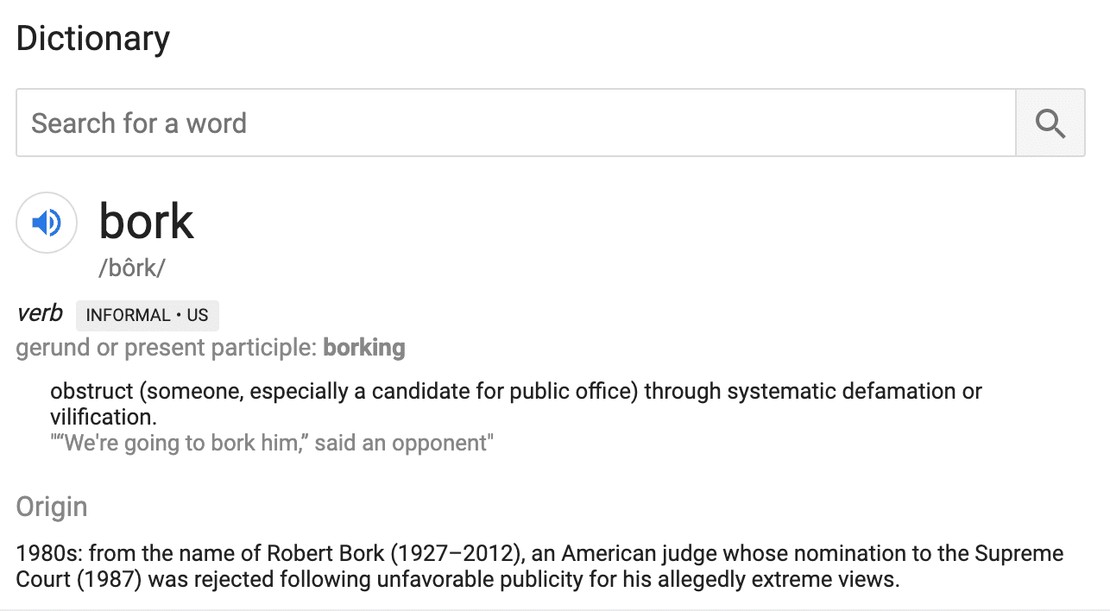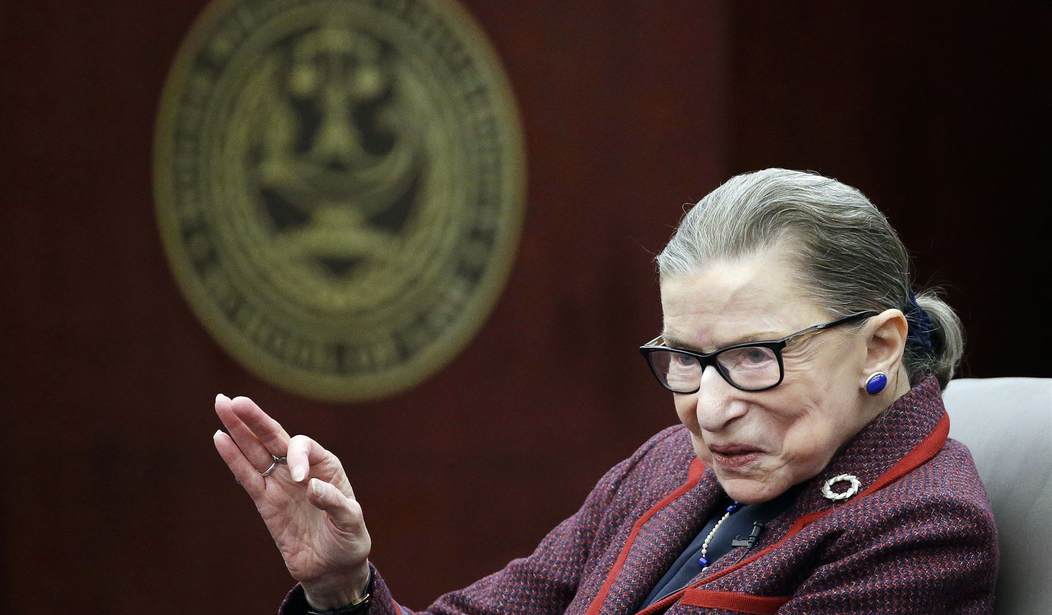During a live question and answer at Georgetown University Law School in September of 2018, Justice Ruth Bader Ginsburg reflected on her life and career. Much was made of her “notorious” status and the two films being made about her at the time. However, something else was going on when she was speaking. The confirmation hearings for Justice Brett Kavanaugh were in progress, and Senator Dianne Feinstein dropped the now infamous Christine Blasey Ford allegations right in the middle.
It appears the original press on this interview was on September 13, 2018. News of the anonymous letter provided to Feinstein’s office broke widely the next day. However, even before that, Justice Ginsburg was lamenting how the Supreme Court nomination process had become so politicized.
After What They Did to Kavanaugh, We Can’t Capitulate to the Democrats on SCOTUS Vacancy
Justice Ginsburg was interviewed by her former law clerk, Goodwin Liu. During the interview, this exchange took place:
Liu: So, looking ahead a little bit, last week we saw the Senate hold confirmation hearings for a nominee to your Court. Many observers have said that the process today looks nothing like your confirmation hearing 25 years ago. President Clinton nominated you in June of 1993. And you were confirmed by the Senate two months later in a vote of 96-3. I might add that the National Asian Pacific American Bar Association was pleased to support your nomination. How would you compare the process that you went through with what is going on today in that process?
RBG: The way it was, was right. The way it is, is wrong. The atmosphere in 93 was truly bipartisan. The vote on my confirmation was 96-3. Even though I had spent about ten years of my life litigating cases under the auspices of the ACLU and I was on the ACLU board and one of their general counsel. My White House handlers asked me questions about my ACLU affiliation. They were very nervous about it. And I said forget it, just forget it. There’s nothing you could do that you could do that would lead me to badmouth the ACLU. And not a single question. No senator asked me any question. Not about that. It was the same for Justice Pryor who was nominated a year later. He had in the 90s, the numbers. Or think of Justice Scalia who was certainly a known character in what was it, 1986. He had been a law professor and written many things, he had been on the D.C. Circuit. The vote was unanimous, every Democrat and every Republican voted for him. But that’s the way it should be. Instead of what it’s become which is a highly partisan show. The Republicans move in lock step, so do the Democrats. I wish I could wave a magic wand, and have it go back to the way it was.
However, Senator Ted Kennedy had turned confirmation hearings into politicized power plays before Ginsburg’s nomination. Kennedy presided over the disastrous confirmation hearings of Robert Bork in 1987, where he was eventually voted down by the full Senate. That mess became its own verb.

Then Joe Biden attempted to bork Justice Clarence Thomas. Still, after that soul-destroying process, Republicans seemed willing to return to some political version of the Marquess of Queensbury rules and confirm judges at the request of the president with overwhelming support. Even someone with a documented history of radical views like Justice Ginsberg. In fact, Biden took ideology off the table by instituting what is referred to as the Ginsburg Rule:
When Sen. Joseph Biden chaired confirmation hearings for Supreme Court nominee Ruth Bader Ginsburg in 1993, he established certain rules for questioning nominees — rules that some of his fellow Democrats seem to have conveniently forgotten.
Ginsburg, while a smart lawyer, had been a radical activist. Her record as an ACLU litigator placed her far outside the mainstream of American law. She had argued for legalizing prostitution, against separate prisons for men and women, and had speculated that there could be a constitutional right to polygamy.
Some Republican senators wanted to know whether she still held such extreme views.
On question after question, though, she refused to answer: The Biden rules stipulated that she had no obligation to answer questions about her personal views or on issues that might come before the Court. Despite her silence, the Senate confirmed Ginsburg, 93-3.
As many are remembering Ginsburg’s friendships with Justices Antonin Scalia and Clarence Thomas, her comments hearken back to when it was expected the president would have nominees confirmed outside of some catastrophic ethical or professional flaw being discovered during the confirmation process. As she also noted, this is no longer the case. One would have to wonder at her opinion the next day when the Christine Blasey-Ford circus started.
Ruth Bader Ginsburg Defended This Pro-Life Activist Against an Abortion Assault
To her credit, she was complimentary towards both Justice Gorsuch and Justice Kavanaugh following their confirmations. She said they were “very decent and very smart.” She also credited Kavanaugh with a first at the Court, noting all of his clerks were female. She said it was his hires that produced another first, more female clerks than male clerks at the nation’s highest court.
Much is being made of Ruth Bader Ginsburg’s supposed final words. Given her on-the-record opinions on the partisan nature of confirmations and court-packing, the purported final statement on when she wanted to be replaced should be viewed with skepticism. She had strong opinions about politicizing the Court as late as July of 2019. WTOP:
In the NPR interview, Ginsburg also weighed in on an idea circulating among some Democrats to increase the number of justices on the court should a Democrat be elected president, saying she disagreed.
“Well, if anything, it would make the court appear partisan. It would be that one side saying, ‘when we’re in power, it was only to enlarge the number of judges so we will have more people who will vote the way we want them to,'” she said. “So I am not at all in favor of that solution to what I see as a temporary situation.”
So, if Democrats would like to honor Justice Ginsburg’s memory, they are doing it all wrong. The animosity in the confirmation process should stop. The idea of court-packing should go the way of the dodo. And indeed, the grilling Dianne Feinstein gave Amy Coney Barrett during her confirmation to the 7th District Court should not be repeated:
When Barrett was nominated to the 7th Circuit, Democrats subjected her to an obnoxious grilling. Sen. Dianne Feinstein said Barrett gave the Democratic side “this very uncomfortable feeling.
”Religion,” Feinstein fumed, has “its own dogma.” To Barrett, she said: “When you read your speeches, the conclusion one draws is that the dogma lives loudly within you, and that’s of concern.”
“Did Dianne Feinstein accuse a judicial nominee of being too Christian?” asked a Washington Post headline. So bald was Feinstein’s bias that Princeton President Christopher Eisgruber and Sen. Orrin Hatch warned that the senator was violating the most emphatic sentence in the entire US Constitution.
“No religious test,” that sentence says, “shall ever be required as a qualification to any office or public trust under the United States.”
Of course, Democrats will heed none of this. There is already talk of “maneuvers” and “arrows in our quiver.” George Stephanopoulos even proposed impeachment of President Trump or Attorney General Bill Barr to Speaker Nancy Pelosi as a pretext to delay a nomination. Most Americans will reject this, just as their treatment of Justice Kavanaugh expanded the Republican Senate Majority.
Democrats mourning Ginsburg is about their perceived loss of power. It has absolutely nothing with her ideals about the non-partisan nature of the Court or the nomination process.
Radical Left Threatens Riots, War, and to ‘Burn It Down’ if Ruth Bader Ginsburg Replaced
WATCH Ginsburg’s full comments below:
Editor’s Note: Want to support PJ Media so we can expose and fight the Left’s radical plans for the Supreme Court? They will stop at nothing, so your support for conservative journalism is more important than ever. Join PJ Media VIP and use the promo code SCOTUS to get 25% off your VIP membership.










Join the conversation as a VIP Member